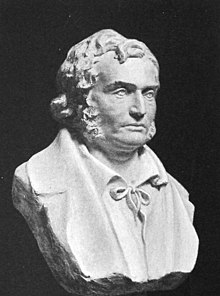Poul Martin Møller
Poul Martin Møller | |
|---|---|
 Bust of Møller by L. Hasselriis | |
| Born | 21 March 1794 Uldum near Vejle |
| Died | 13 March 1838 Copenhagen |
| Occupation | Poet, academic |
| Nationality | Danish |
Poul Martin Møller (21 March 1794 – 13 March 1838)[1] was a Danish academic, writer, and poet. During his lifetime, he gained renown in Denmark for his poetry. After his death, his posthumously published fiction and philosophical writings were well received. He also devoted several decades of study to classical languages and literature. While serving as a professor at the University of Copenhagen, he was a mentor to the philosopher Søren Kierkegaard.[2]
Life and career
Møller was born near

Although eccentric, notoriously disheveled,[3] and prone to becoming distracted during lessons, his good nature and pleasant disposition allowed him to become a popular teacher.[7][8][9] In 1831, he was promoted to Professor Extraordinary at the University of Copenhagen, where he taught Hegel, classical literature, and moral philosophy.[2] His first wife died in 1834, an event which left him shaken to the core and almost unable to function.[6][9] Two years later, he married a friend of his late wife. He fathered a daughter with his second wife before succumbing to what was most likely liver cancer in March 1838.[9]
Writings
While working as a teacher he wrote extensively, working on poetry, a novel, and translating literature into Danish. He published translations of both contemporary and classical authors, including
Relationship with Kierkegaard
Møller is perhaps best known for relationship with
To the late Professor Poul Martin Møller, The happy lover of Greek culture, the admirer of Homer, the confidant of Socrates, the interpreter of Aristotle, Denmark’s joy in "Joy over Denmark", though "widely traveled" always "remembered in the Danish summer", the object of my profound admiration, my profound loss, this work is dedicated.
Concluding Unscientific Postscript, Hong p. 351-352
In his journals, Kierkegaard notes that Møller provided him advice about the study of philosophy and communication. Part of Møller's influence came through his lectures on moral philosophy and the Greek and Roman classics that Kierkegaard attended while a student at the University of Copenhagen.
Philosophy
There is also significant common ground between the philosophical views of Møller and Kierkegaard, in large part due to Møller's tutelage. After Møller's writings were published posthumously, Kierkegaard studied them in great detail.
Møller's philosophy was also influenced by the theological work of the
Notes
- ^ Jensen 2009, p. 101
- ^ a b c d e Hannay 2001, p. 48
- ^ a b c d Garff 2004, p. 87
- ^ a b c Jensen 2009, p. 102
- ^ a b c d Jensen 2009, p. 103
- ^ a b c d e f Garff 2004, p. 88
- ^ a b Hannay 2001, p. 47
- ^ a b Jensen 2009, p. 104
- ^ a b c Jensen 2009, p. 107
- ^ Jensen 2009, p. 122
- ^ Aaserud 2005, p. 344
- ^ a b Jensen 2009, p. 110
- ^ a b Jensen 2009, p. 109
- ^ a b Jensen 2009, p. 117
- ^ Hannay 2001, p. 97
- ^ Garff 2004, p. 97
- ^ Jensen 2009, p. 116
- ^ Jensen 2009, p. 160
- ^ Garff 2004, p. 89
- ^ Garff 2004, p. 94
- ^ Jon Stewart (ed.), A Companion to Kierkegaard, John Wiley & Sons, 2015, p. 68.
References
- Aaserud, Finn (2005), Collected Works: The political arena (1934-1961), Niels Bohr Collected Works, vol. 11, London: Elsevier Science, ISBN 978-0-444-51336-6
- Garff, Joakim (2004), Kierkegaard: A Biography, Princeton: Princeton University Press, ISBN 9780691091655
- Hannay, Alastair (2001), Søren Kierkegaard: A Biography, Cambridge: Cambridge University Press, ISBN 978-0-521-53181-8
- Jensen, Finn Gredal (2009), Stewart, Jon (ed.), Kierkegaard and his Danish Contemporaries - Philosophy, Politics and Social Theory, Kierkegaard Research: Sources, Reception, Resources, vol. 7, Farnham: Ashgate, ISBN 978-0-7546-6872-5
External links
- A book of Danish verse (Poul Møller) Translated into English (1922)
- Poul Martin Møller page at Kalliope.org (in Danish)
- Biography at Project Runeberg (in Danish)
